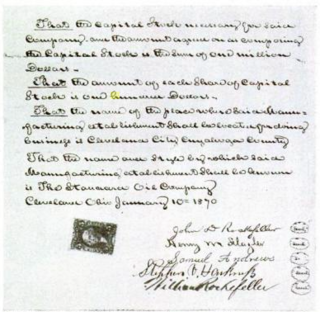
A corporation is an organization—usually a group of people or a company—authorized by the state to act as a single entity and recognized as such in law for certain purposes. Early incorporated entities were established by charter. Most jurisdictions now allow the creation of new corporations through registration. Corporations come in many different types but are usually divided by the law of the jurisdiction where they are chartered based on two aspects: by whether they can issue stock, or by whether they are formed to make a profit. Depending on the number of owners, a corporation can be classified as aggregate or sole.

The Delaware General Corporation Law is the statute of the Delaware Code that governs corporate law in the U.S. state of Delaware. The statute was adopted in 1899. Since then, Delaware has become the most prevalent jurisdiction in United States corporate law. Delaware is considered a corporate haven because of its business-friendly corporate laws compared to most other U.S. states. 66% of the Fortune 500, including Walmart and Apple are incorporated in the state. Over half of all publicly traded corporations listed in the New York Stock Exchange are incorporated in Delaware.
Business is the practice of making one's living or making money by producing or buying and selling products. It is also "any activity or enterprise entered into for profit."
A trade name, trading name, or business name is a pseudonym used by companies that do not operate under their registered company name. The term for this type of alternative name is a "fictitious" business name. Registering the fictitious name with a relevant government body is often required.

A limited liability company is the United States-specific form of a private limited company. It is a business structure that can combine the pass-through taxation of a partnership or sole proprietorship with the limited liability of a corporation. An LLC is not a corporation under state law; it is a legal form of a company that provides limited liability to its owners in many jurisdictions. LLCs are well known for the flexibility that they provide to business owners; depending on the situation, an LLC may elect to use corporate tax rules instead of being treated as a partnership, and, under certain circumstances, LLCs may be organized as not-for-profit. In certain U.S. states, businesses that provide professional services requiring a state professional license, such as legal or medical services, may not be allowed to form an LLC but may be required to form a similar entity called a professional limited liability company (PLLC).

A joint-stock company is a business entity in which shares of the company's stock can be bought and sold by shareholders. Each shareholder owns company stock in proportion, evidenced by their shares. Shareholders are able to transfer their shares to others without any effects to the continued existence of the company.

Incorporation is the formation of a new corporation. The corporation may be a business, a nonprofit organization, sports club, or a local government of a new city or town.

A limited liability partnership (LLP) is a partnership in which some or all partners have limited liabilities. It therefore can exhibit aspects of both partnerships and corporations. In an LLP, each partner is not responsible or liable for another partner's misconduct or negligence. This distinguishes an LLP from a traditional partnership under the UK Partnership Act 1890, in which each partner has joint liability. In an LLP, some or all partners have a form of limited liability similar to that of the shareholders of a corporation. Depending on the jurisdiction, however, the limited liability may extend only to the negligence or misconduct of the other partners, and the partners may be personally liable for other liabilities of the firm or partners.

Corporate law is the body of law governing the rights, relations, and conduct of persons, companies, organizations and businesses. The term refers to the legal practice of law relating to corporations, or to the theory of corporations. Corporate law often describes the law relating to matters which derive directly from the life-cycle of a corporation. It thus encompasses the formation, funding, governance, and death of a corporation.
The Australian Securities and Investments Commission (ASIC) is an independent commission of the Australian Government tasked as the national corporate regulator. ASIC's role is to regulate company and financial services and enforce laws to protect Australian consumers, investors and creditors. ASIC was established on 1 July 1998 following recommendations from the Wallis Inquiry. ASIC's authority and scope are determined by the Australian Securities and Investments Commission Act 2001.

A privately held company is a company law whose shares and related rights or obligations are not offered for public subscription or publicly negotiated in the respective listed markets but rather the company's stock is offered, owned, traded, exchanged privately, or over-the-counter. In the case of a closed corporation, there are relatively few shareholders or company members. Related terms are unquoted company and unlisted company.
The Employer Identification Number (EIN), also known as the Federal Employer Identification Number (FEIN) or the Federal Tax Identification Number, is a unique nine-digit number assigned by the Internal Revenue Service (IRS) to business entities operating in the United States for the purposes of identification. When the number is used for identification rather than employment tax reporting, it is usually referred to as a Taxpayer Identification Number (TIN). When used for the purposes of reporting employment taxes, it is usually referred to as an EIN. These numbers are used for tax administration and must not be used for any other purpose. For example, an EIN should not be used in tax lien auction or sales, lotteries, or for any other purposes not related to tax administration.

In corporate governance, a company's articles of association is a document which, along with the memorandum of association form the company's constitution. The AoA defines the responsibilities of the directors, the kind of business to be undertaken, and the means by which the shareholders exert control over the board of directors.

WLYK is a radio station licensed to Cape Vincent, New York. Owned by Border International Broadcasting and operated by 1234567 Corporation, a company owned by the co-founders of Canadian broadcaster My Broadcasting Corporation, it primarily broadcasts a gold-based adult contemporary format that targets the larger neighboring Canadian market of Kingston, Ontario. It is a member of Nielsen BDS' Canadian Border Stations Airplay panel.

Australian corporations law has historically borrowed heavily from UK company law. Its legal structure now consists of a single, national statute, the Corporations Act 2001. The statute is administered by a single national regulatory authority, the Australian Securities & Investments Commission (ASIC).

A Delaware statutory trust (DST) is a legally recognized trust that is set up for the purpose of business, but not necessarily in the U.S. state of Delaware. It may also be referred to as an Unincorporated Business Trust or UBO.

ESC Corporate Services is a private Ontario corporation that acts as a licensed government service provider under contract with the Ministry of Government Services (MGS). This company is best known by Canadian law firms and the business community as the direct link to the government, whereby ESC Corporate Services acts as a facilitator of regulatory compliance by providing access to government records, government's registration and filing services. The most widely used government services facilitated by ESC Corporate Services include Incorporations, PPSA searches, registrations, Security Searches and trade name registrations.

In the United States, a benefit corporation or B corporation is a type of for-profit corporate entity, authorized by 36 U.S. states and the District of Columbia, that includes positive impact on society, workers, the community and the environment in addition to profit as its legally defined goals, in that the definition of "best interest of the corporation" is specified to include those impacts. Laws concerning conventional corporations typically do not specify the definition of "best interest of the corporation", which has led to the interpretation that increasing shareholder value is the only overarching or compelling interest of a corporation. Benefit corporations may not differ much from traditional C corporations. A C corporation may change to a B corporation merely by stating in its approved corporate bylaws that it is a benefit corporation; however in certain jurisdictions, the terms "public benefit corporation" or "PBC" are also required to be in the legal name of B corporations.






